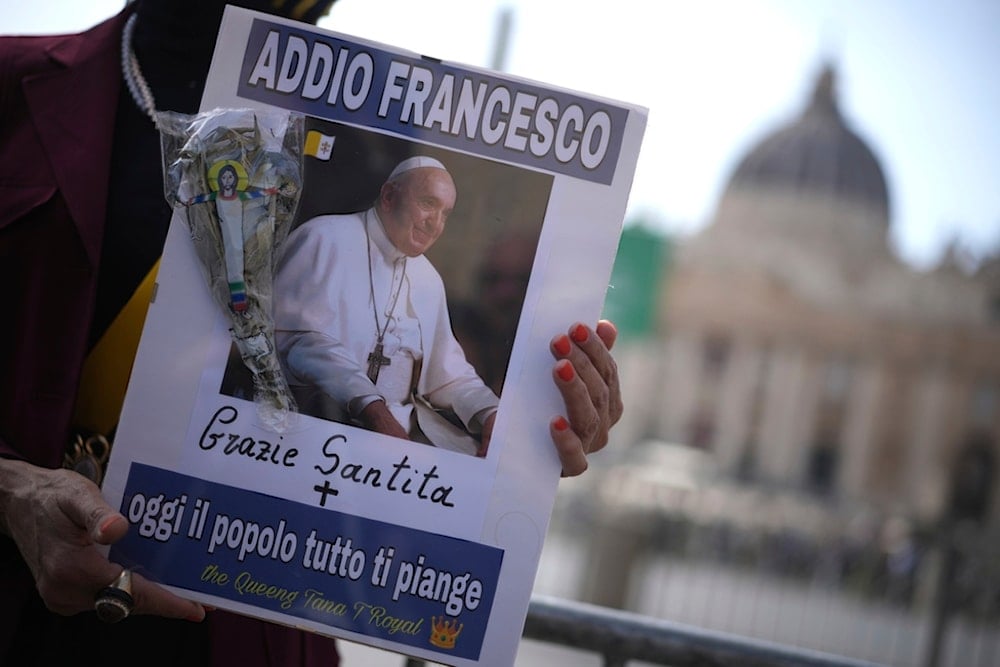What is the Vatican going to do after Pope Francis' death?
The selection of a new pope is set to shape the future direction of the Catholic Church, both doctrinally and institutionally, through a centuries-old tradition.
-

A woman holds a picture of Pope Francis reading in Italian, 'Farewell Francis, thank you, His Holiness, today all the people cry for you' in St. Peter's Square at the Vatican after the death of Pope Francis was announced, Monday, April 21, 2025 (AP)
The Catholic Church is entering a critical transitional phase as the College of Cardinals prepares to convene at the Vatican to elect a new pope following the death of Pope Francis, who passed away Monday at the age of 88.
A defining moment for the Church
The selection of a new pope is set to shape the future direction of the Catholic Church, both doctrinally and institutionally. The election process follows centuries-old traditions.
Cardinals under the age of 80 will gather in the Sistine Chapel for a secret vote, and a two-thirds majority is required for any candidate to be elected.
If no consensus is reached in the initial rounds, voting continues until a candidate secures the necessary support. The world will closely watch the chimney above the chapel; black smoke signals inconclusive results, while white smoke announces the successful election of a new pontiff.
Key contenders to succeed Pope Francis
According to US media analyses, five prominent candidates have emerged as frontrunners in the upcoming papal conclave:
Cardinal Luis Antonio Tagle (67) – Filipino
Currently seen as the leading candidate, Cardinal Tagle has a strong background in missionary work and heads the Dicastery for Evangelization. He is widely viewed as a proponent of Pope Francis’s reform agenda.
Cardinal Pietro Parolin (70) – Italian
Serving as the Vatican’s Secretary of State since 2013, Parolin is known for his diplomatic acumen and theological moderation. He is considered a stabilizing figure who may continue reform efforts while maintaining institutional balance.
Cardinal Peter Turkson (76) – Ghanaian
A prominent advocate for social justice, Turkson’s election would mark the first African pope since the 5th century, an incredibly significant development.
Cardinal Péter Erdő (72) – Hungarian
A conservative canon law expert, Erdő represents traditionalist voices within the Church. He is known for defending core doctrinal positions.
Cardinal Angelo Scola (82) – Italian
A traditional candidate who was among the top contenders in the 2013 conclave, Cardinal Scola's advanced age may limit his chances this time.
The anticipated conclave
The papal conclave traditionally begins 15 to 20 days after the pope’s death, allowing time for funeral rites and a nine-day mourning period.
The conclave proceedings, held in the Sistine Chapel, attract global attention as the Church faces growing challenges, including declining influence in the West and rising prominence in the Global South.
The new pope will be tasked with navigating a delicate balance between reformist and conservative factions. Urgent priorities include addressing issues of transparency, governance, and adapting to global social changes, all amid ongoing demographic shifts and theological debates within the Church.
The first Latin Pope passes
Pope Francis, the first Jesuit and first Latin American pontiff, passed away on Monday at the age of 88 after a long battle with health issues, including double pneumonia.
The Vatican confirmed the news in a statement issued by Cardinal Kevin Farrell.
“Dearest brothers and sisters, it is with deep sorrow that I must announce the death of our Holy Father Francis,” Cardinal Farrell said via the Vatican's Telegram channel.
“This morning at 7:35 am (0535 GMT), the Bishop of Rome, Francis, returned to the home of the Father. His entire life was dedicated to the service of the Lord and His church.”
Legacy of reform
When Francis ascended to the papacy, the Catholic Church was reeling from decades of sexual abuse scandals and internal divisions.
He worked to revise canon law and open leadership roles in Vatican offices to laypeople.
His later years saw growing opposition from conservative cardinals, especially during the Vatican’s Synod in late 2023, part of a wide-ranging global consultation on the Church’s future, a process that now remains unfinished.

 4 Min Read
4 Min Read








